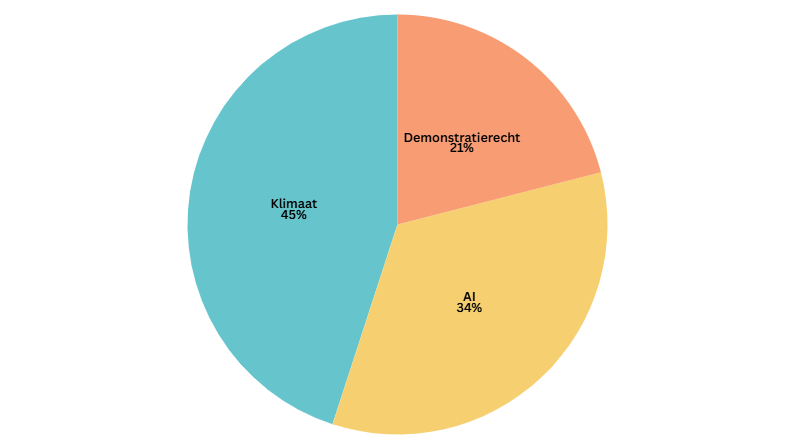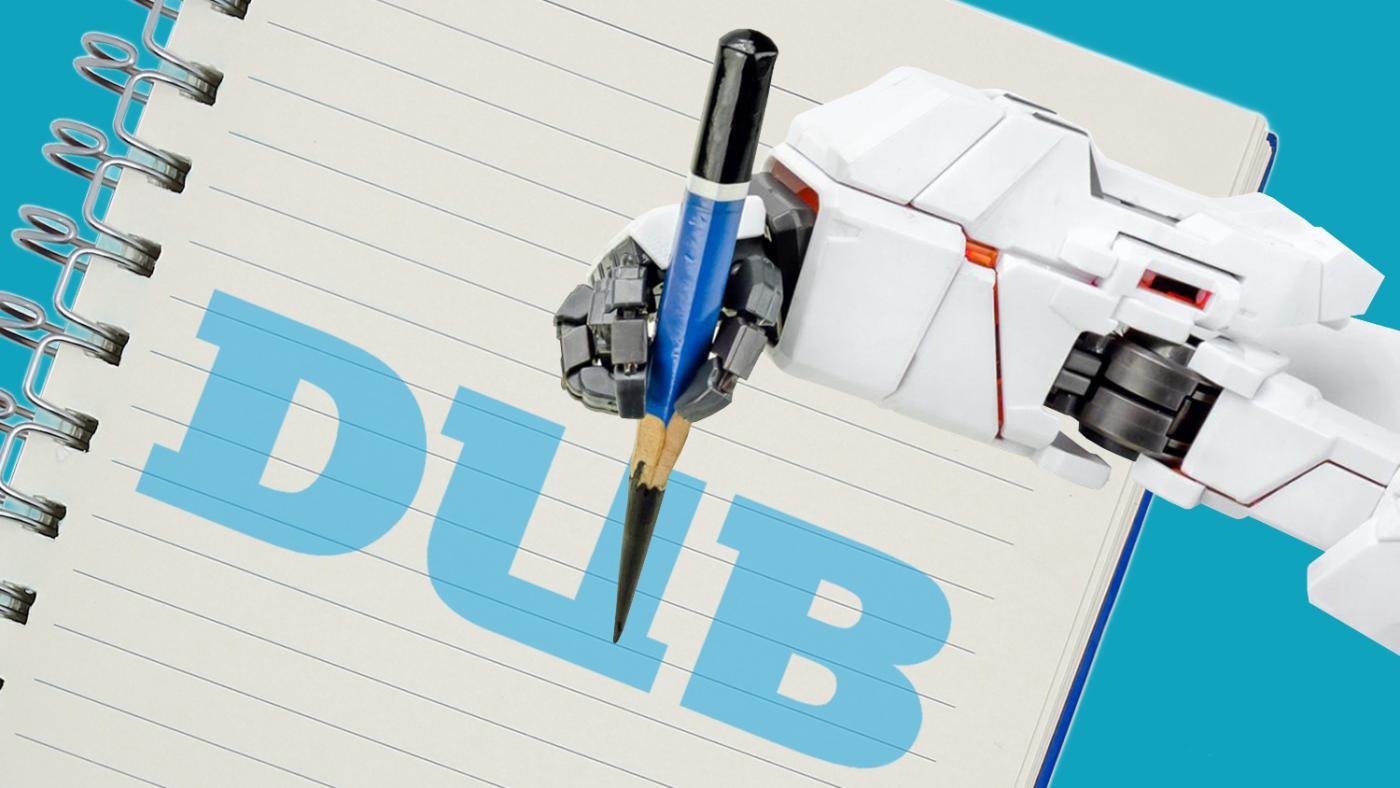What most DUB readers want to know more about
Can an individual help save the climate?

To what extent can you compel people to contribute to saving the planet? That is the most pressing question according to the majority of DUB readers in response to our request what topic DUB should write about in depth. “The international community appears incapable of taking joint measures to limit the risk of dangerous climate change, while today's students will be exposed to greatly increased risks from 2050 onwards.” According to this reader, that makes this topic urgent. He adds: to what extent can local democracies (including the university council) impose binding measures? What are the ethical, legal and practical considerations?
These are dilemmas raised by several people who responded to our request. One respondent writes: “It is a socially relevant issue that is being pushed aside in current politics”.
In March, DUB asked its readers to choose a current topic that deserves more attention. The idea was inspired by the media site Le Drenche, which challenges young people to join the conversation about current issues. We selected three social themes related to university life. In addition to individual responsibility for the climate, they could choose from the themes of the influence of artificial intelligence on university degrees and the limits of the right to demonstrate.
A total of 47 students and staff responded on our website, explaining their choice and giving advice on how the chosen theme should be approached. Half of them chose the climate and the question of individual responsibility in saving the planet as the most urgent theme. 30 percent chose the theme of artificial intelligence and the question of whether the value of a degree would decline as a result of AI, and 20 percent wanted to know more about the right to demonstrate and the ways this is being challenged.
We also conducted a poll on Instagram, in which 64 people participated. Here too, ‘the climate’ scored highest with 42 percent of the votes, AI came second with 24 percent, and the right to demonstrate 13 percent.

Via the website and the poll on Instagram, 111 readers indicated which topic they would like more information about. This is the breakdown in percentages.
Impact on climate change
The readers add comments how we approached articles about the climate. Several readers feel it is important to substantiate things with figures. To what extent does behaviour of an individual have affect climate change? Or does it make no difference if you choose not to fly as? And do measures only work if they are agreed upon nationally or globally? The question also arises as to what the consequences would be if we postpone climate measures and therefore do nothing. According to readers, the figures also determine the extent to which it makes sense to impose obligations on people.
Responsibility
“Where does an obligation begin and end?”, one reader asks. “Who exactly is obliged to do what? And what are the consequences of not complying?” Readers also want to know how to distinguish between individual responsibility (and what that looks like) and the responsibility of countries or politicians. “It pains me to see how indifferent many people are,” one reader writes.
Several readers mention the role of the university. What can students and staff (both individually and collectively) do when it comes to the climate crisis? Does the university have a role model function in this regard?
Readers are curious about the university's own sustainability policy. Several respondents note that the university has still not opted for a vegetarian or vegan canteen. Shouldn't the UU make this mandatory? And should fewer conferences be organised and should the UU only reimburse travel by public transport? Here too, the question arises as to what extent the university should make this mandatory. “Is that even feasible with the rise of far-right parties?” someone wonders.

Open Minds
DUB will therefore look for figures. What research is being done at the UU to measure the impact of individual contributions? We will also ask scientists about the ethics. What are the grounds for imposing real obligations on the population, or is it better to encourage people to improve their behaviour? And what arguments would you use?
In addition, we are organising a dialogue to explore the different ideas and opinions on this topic. What do you consider important when it comes to climate or freedom of choice? We are doing this in collaboration with the Comenius educational innovation project Open Minds, which aims to stimulate the exchange of perspectives and make complex topics discussable. We invite students, scientists and other staff members to participate in this dialogue to explore the different perspectives on this topic and what we can learn from each other. Would you like to participate and discuss this topic? Please send an email to dubredactie@uu.nl
We are also calling on academics who have conducted research in the field of climate responsibility, as well as students and other groups who are working on this issue.

The topic of AI
Will current diplomas lose their value with the advent of artificial intelligence? This is not a theme that was chosen. However, we did receive some interesting questions and comments on this subject.
“This question keeps me awake at night,” one student says. “What is the future of humanity in a society where work is almost entirely done by AI and robots?” another student asks.
Not everyone is negative about the subject. Artificial intelligence can also contribute to a better society. It is not about whether degrees will become worthless, but about how universities anticipate developments and redesign education with AI in mind. Some respondents say that the impact of AI on our lives is comparable to the industrial revolution or the advent of electricity. “It is that big, and much of our lives will change radically.”
We recently published several articles on the influence of AI on education. And we will continue to do so.

Right to demonstrate
The other topic that was dropped was the right to demonstrate. “In the current political climate, it is crucial that the debate is held. Demonstrating is an essential part of that. If we are no longer allowed to demonstrate and debate openly (as we are seeing in the USA), AI-related issues and the climate will also be at risk. That is why I chose this option in your difficult selection menu,” a reader.
Someone else notes that universities are restricting the right to demonstrate. He finds this strange, because universities of all places should know that this is a fundamental human right enshrined in international treaties.
Many readers who choose this topic point to the war in Gaza and the many deaths caused by the Israeli army. Such atrocities provoke protest, so how can you even consider restricting the right to demonstrate, several people ask.
However, there are also other voices. Is it acceptable to occupy a building to express your opinion? After all, that is more drastic than simply expressing your opinion. Someone also wondered whether an organisation such as Extinction Rebellion does not actually cause more damage through radical actions that make people feel less involved in the relevant climate targets.
This is the first time that DUB wants to invite readers to contribute their thoughts on current articles. If you have any suggestions for new topics or ideas for interviewing a scientist who fits in with the chosen theme, please let us know. Send an email to dubredactie@uu.nl.